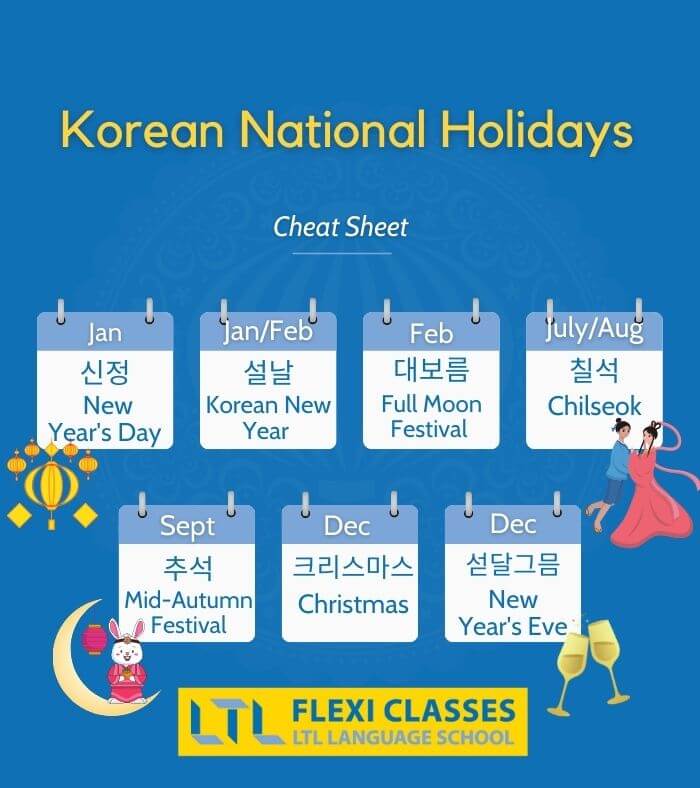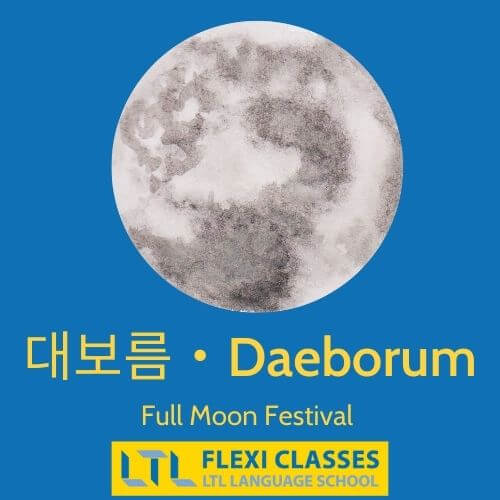Launched in 2020, our Flexi Class system has been a huge hit with students so far. Here are three reasons why this is the BEST…
2024 KOREAN NATIONAL HOLIDAYS
Below is a list of the 2024 Korean National Holidays.
We will also dig deeper and talk about the significance of the Korean Public Holidays and how they are celebrated.
There is also a list of the 2025 Korean National Holidays for your reference below as well.
Throughout the page we’ve also created a number of images (including the one you can see here) that you can download, share and save.
Let’s learn about the Korean National Holidays in more detail now!
First up, the dates for 2024.

Korean Public Holidays | Korean Holidays in 2024
Korean Public Holidays | Korean Holidays in 2025
Korean Public Holidays | How Does Korea Celebrate Holidays?
Korean Public Holidays | FAQ’s
HOW DOES SOUTH KOREA CELEBRATE HOLIDAYS?
Here’s a quick rundown on how Korean people celebrate the big days in the calendar.
Korean New Year
Korean New Year, or 설날 (Seollal), is celebrated during the lunar new year, is one of the most important Korean holidays.
The date of Korean New Year will change each year as it follows the Lunar Calendar.
On this day, Korean people visit family, perform ancestral rites, and wear hanbok (traditional Korean clothing).
Children also often receive red packets, which contain money, from relatives.
Food eaten includes tteokguk and jeon, which are soup with sliced rice cakes and savoury pancakes respectively.

Daeborum
Daeborum, celebrated February 15th, is also called the Great Full Moon Festival. It celebrates the first full moon after the Korean New Year.
On Daeborum, people eat many traditional types of Korean food and partake in a number of local Korean traditions.
These include cracking nuts to ensure protection from skin diseases and drinking gwibalgisul (귀밝이술).
Gwibalgisul is a shot of liquor that keeps away ear infections and illnesses.
It ensures that you only hear good news for the rest of the year.

Chilseok
Chilseok is the Korean equivalent to Japan’s Tanabata festival and Romeo and Juliet.
It celebrates the one day a year that Jiknyeo and Gyeonwu, a couple separated by the Milky Way, can meet.
In Korea, people eat food made of wheat on Chilseok and take baths for good health.
DID YOU KNOW | Chilseok falls on the seventh day of the seventh month of the Korean Lunar Calendar.

Chuseok
Chuseok is the annual mid-autumn festival, which is held around the Autumn Equinox.
Chuseok is the biggest traditional holiday in South Korean aside from Korean New Year.
On this day, Korean people visit their hometowns and families, eat songpyeon (a type of Korean rice cake), and pay respects to their ancestors.
In fact, Mid Autumn Festival isn’t just celebrated in Korean, but other countries throughout Asia as well.
Check out our guide to the Mid Autumn Festival from a Chinese perspective.

Hangul Day
Now for a holiday that most certainly is only celebrated in Korea!
Hangul Day is a celebration of the creation of the Hangul alphabet by King Sejong in 1443.
Prior to the alphabet’s creation, Korean people wrote using Chinese characters, and literacy rates were much lower, as only wealthy people could afford to devote time and energy to learning thousands of Chinese characters.
While the new writing system took a while to catch on, by the mid-20th century, it was widely used in Korea.
Today it is celebrated as one of the most significant achievements of King Sejong the Great, who is regarded as one of Korea’s best kings.
Check out our full guide to the Korean alphabet here. It’s actually really quite easy to learn.

Christmas
Unlike in Japan, in South Korea 25-30% of the population is Christian, which is why Christmas is a national holiday, so everyone has the day off.
On Christmas, people celebrate by going to church, putting up light displays (often in shopping districts rather than their own homes), and eating Christmas cake.
Fun fact | Instead of traditional Christmas music, K-pop groups will often release special Christmas songs, which you’ll hear played in stores!
Money is a common gift, and presents are usually only given to one’s significant other, rather than between family and friends.
And just to make things even easier, the Korean pronunciation for Christmas is simply…
크리스마스 (keuriseumaseu)

That completes our guide to the Korean public holidays. Hopefully this gives you a clearer idea of the most important days in the Korean calendar.
Want to learn more about public holidays in Asia? Why not…
- Discover the Chinese National Holidays
- Find out the most important Japanese Public Holidays
- Learn about the big six National Holidays in Vietnam
DID YOU KNOW | You can now study Korean in Korea with LTL. We offer group classes, individually tailored courses and even homestay experiences in Seoul.
Drop us a message if you are interested in this incredible experience.
KOREAN NATIONAL HOLIDAYS // FAQ’S
How many national holidays does Korea have?
Korea has 13 national holidays in total.
When is Seollal in 2024?
Seollal, or Korean New Year, is celebrated on February 10th in 2024.
It will be on January 29th in 2025.
When is Seollal in 2025?
It will be on January 29th in 2025.
Does Korea celebrate Christmas?
Yes, about 30% of Koreans are Christian, so Christmas is a national holiday in Korea, and everyone gets the day of work.
Korea is the only country in East Asia to do so.
What is Daeborum?
Daeborum celebrates the first full moon after the Korean New Year.
On Daeborum, people eat traditional foods meant to ward off various diseases and bad luck.
How many other holidays does Korea have?
Koreans celebrate or observe 13 other holidays, of which 4 (Valentine’s Day, Daeborum, Chilseok, and New Year’s Eve) are significant.
What is the most important holiday in Korea?
The most important holiday on the Korean calendar is Seollal, or the Korean New Year, since everyone celebrates it and travels home to see their families (whereas only a third of the country celebrates Christmas, for example).
What is Chuseok and when is it?
Chuseok, or the mid-autumn festival, is the biggest traditional holiday in Korea aside from Seollal.
It is held around the autumn solstice, and people visit their families and pay respects to their ancestors during the festival.
When is Hangul Day?
Hangul Day, which celebrates King Sejong the Great’s invention of the Hangul alphabet, which has greatly increased the literacy of the Korean people, is held annually on October 9th.

















 Hi, my name is Manuel! I am from Spain and I am a Student Advisor at LTL. I’m now based at our Seoul School after living 3 years in Taipei.
Hi, my name is Manuel! I am from Spain and I am a Student Advisor at LTL. I’m now based at our Seoul School after living 3 years in Taipei. Hi, my name is Mojca! I am from Slovenia in Europe and I work as a student advisor at our Shanghai school.
Hi, my name is Mojca! I am from Slovenia in Europe and I work as a student advisor at our Shanghai school.